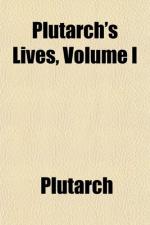|
This section contains 4,879 words (approx. 17 pages at 300 words per page) |

|
SOURCE: Russell, W. M. S. “Plutarch as a Folklorist.” In Folklore Studies in the Twentieth Century: Proceedings of the Centenary Conference of the Folklore Society, edited by Venetia J. Newall, pp. 371-78. Suffolk, Eng.: D. S. Brewer, 1980.
In the following essay, Russell investigates Plutarch's interest in and use of folklore in his writings.
The late Victorian scholar Frank Byron Jevons was a folklorist of some distinction; he was one of the eight experts chosen to review the second edition of The Golden Bough in Folklore in 1901.1 In 1892, Jevons published a new edition of Philemon Holland's seventeenth-century translation of Plutarch's Roman Questions. ‘On the whole,’ writes Jevons at the opening of his Introduction, ‘Plutarch's Romane Questions may fairly be said to be the earliest formal treatise written on the subject of folklore. The problems which Plutarch proposes for solution are mainly such as the modern science of folk-lore undertakes...
|
This section contains 4,879 words (approx. 17 pages at 300 words per page) |

|


